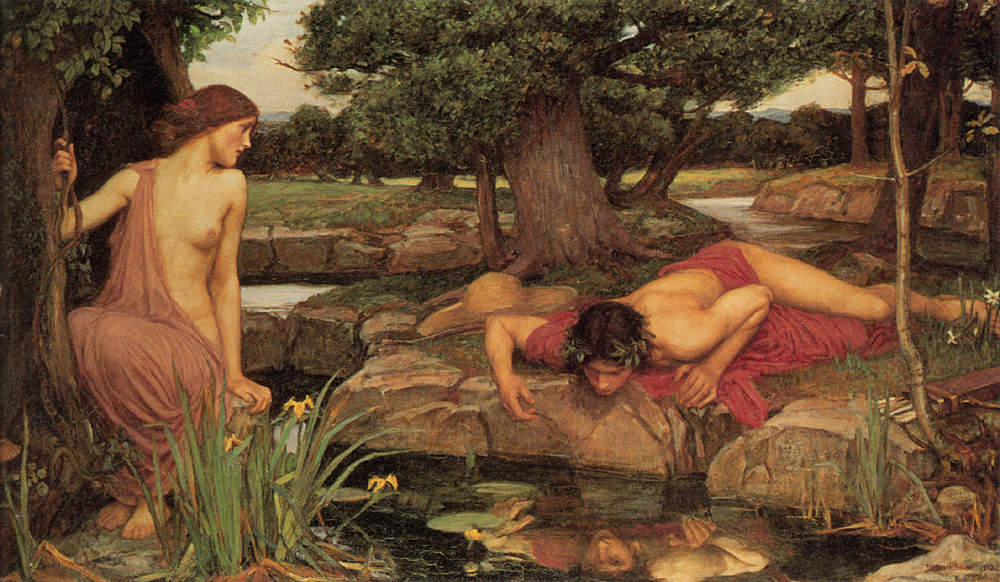I’ve been working on a novel. Big shock, right? Actually, I have four or five novels in progress, but the one that seems closest to the point of, well, getting written is one that has had me researching everything from Benjamin Banneker to the history of the Kamikaze, from the effect of trauma on the developing brain to the theories of ego and brain evolution. Oh, and I had to study the history of the Dalai Lamas. In the course of making a lot of notes and brainstorming, I wrote the core of an essay about Narcissus. That must have been when I was studying up on ego. It’s not going into the novel, even if the thing gets written, so I’ve expanded it here.
Most of us know Narcissus because he has a personality disorder named for him. Sufferers are known to have inflated opinions of themselves, to be in love with themselves. Those of us unfortunate enough to have had narcissists in their lives know they actually are victims of tragic insecurity and low self-esteem, and that they will stop at nothing to control the people around them and separate those they “love” from any family or friends who might be a threat to that control.
But the “real” Narcissus didn’t want to control others. Indeed, he largely wanted to avoid them.
The story of Narcissus comes to us from Greek mythology. The son of a river nymph who was raped by a river god, Narcissus was possibly the most beautiful human ever born. Lucky him? No. The blind seer Tiresias (a lousy trouble-maker, see my entries on Oedipus) predicted that Narcissus would have a short, tragic life if ever he came to know himself.
What happened from there is fuzzy–or, rather, it’s multifarious. Different storytellers told different things. Maybe Narcissus was hateful and despised everyone. Maybe he had a lot of lovers, but soon tired of their shallowness and realized they only loved his looks. Maybe Narcissus was loved by a boy, Ameinias, whom he rejected. Maybe Ameinias prayed to the goddess Nemesis to be revenged on Narcissus.
Lotta characters to keep typing in “Narcissus.” I called Oedipus “Oed.” Can I call Narcissus “Narc?”
You’re right. Best keep that one off the table.
Maybe Narcissus, feeling Ameinias deserved a consolation prize, and gave him a nice sword. But maybe Ameinias was so despondent that he used said sword to kill himself on Narcisssus’s doorstep.
All versions agree that Narcissus came to a pool, and, thirsty, stopped to take a drink. At this point, the eyes of Echo fell upon him. Echo was a mountain nymph who had lost her voice as a punishment for deceiving Hera. As soon as she saw Narcissus, she fell in love with him, because, well… look at him! Echo longed to tell him of her love, but she had a disability. Echo, you see, had once met up with Hera, queen of the Olympian gods. Hera was (and maybe this just goes without saying) looking for her husband and his latest paramour. She had a pretty good idea where he was, and was all ready to spring upon him en flagrante delecto… when she bumped into Echo. Echo, at the time, was such a chatterbox that even the imperious matron of Olympus could not get a word in edgewise. Hera was so distracted and for so long by Echo’s non-stop monologues that Zeus was able to get away. Hera took her revenge, not on her husband or his girlfriend, but upon poor, babbling Echo. She took away Echo’s voice. Mostly.
Echo could only speak by repeating words she had just heard. So her pickup lines for Narcissus were pretty much on the order of “Who’s there?”, “Who are you?”, “Why are you staring at me?”, and “Leave me alone, you zealot!” (I may have invented some of those.)
In addition to a limited vocabulary, Echo’s campaign to seduce Narcissus suffered from bad timing. Before she arrived, Narcissus had, apparently for the first time ever, seen his own reflection. (I guess his mom had made enough out of Tiresias’s vague prophecy that she removed all mirrors from the house. Or maybe she was a vampire.) Seeing himself, and, being only human, Narcissus reacted in the usual way. He fell in madly in love.
So Echo did, after all, get to say one thing that should have moved her closer to her goal. She got to say, “I love you.” But only because Narcissus was already saying it to the boy in the water. His attention (along with is affection) was already claimed. He paid no mind to Echo, and they both pretty much died. Echo pined away until she was just a voice.
As to Narcissus, here again the versions diverge. Maybe he just stared at himself until he died from hunger. Maybe he tried to consummate his love and drowned. Maybe he just magically transformed because some god or other took pity on him, and turned him into a flower. Or maybe he, like Ameinias, took his own life because he could never touch the object of his desire; and then his blood caused a new flower to grow.
What does it all mean? Other than, “Don’t fall in love with yourself, it’s considered rude?”
I’m glad you asked. The answer, as well as the bulk of the essay I found in my notes, shall be delivered next week.

